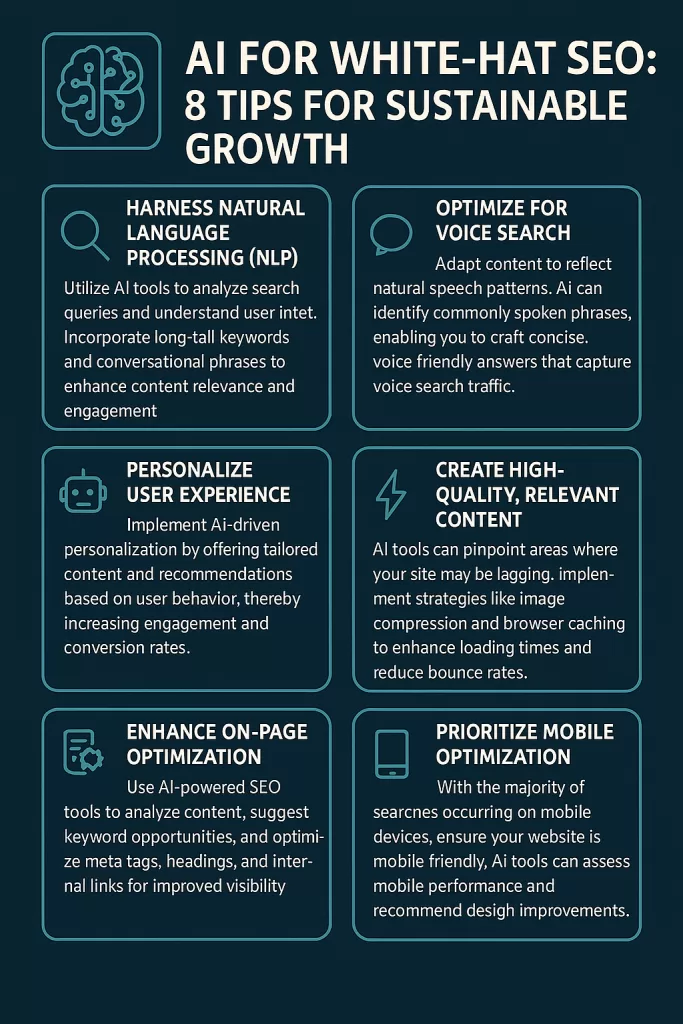Innovative White-Hat SEO Tips for Long-Term Growth
In today’s fast-changing digital landscape, SEO isn’t about gaming the system; rather, it’s about working with it. Consequently, white-hat SEO remains the most reliable and sustainable path to achieving lasting online visibility. At Teknikali Tech, we believe that ethical optimization, backed by smart AI tools and best practices, delivers not just better rankings, but long-term success.
In this article, we’ll walk you through 8 innovative, white-hat SEO hacks that go beyond quick fixes. Whether you’re optimizing a blog, an eCommerce site, or a SaaS product, these techniques will help you rise in the search results and stay there.
🔍 Quick Summary: What You’ll Learn
In this article, you will discover eight innovative white-hat SEO strategies that leverage AI to boost rankings sustainably. These methods are not only ethical but also long-term, ensuring your site remains safe from Google penalties.
Key Takeaways:
- How AI helps uncover low-competition, high-intent keywords
- Techniques to write human-friendly, optimized content
- White-hat link building using smart outreach tools
- Tips to improve site UX and Core Web Vitals with automation
- How to use AI to monitor and adapt to algorithm changes
- Leveraging schema and structured data for better SERP visibility
- Ethical content repurposing with the help of AI
- The role of predictive analytics in future-proofing SEO strategy
1. Use AI to Discover Low-Competition, High-Intent Keywords
Keyword research has long been the foundation of SEO. However, today’s AI tools like SurferSEO, Keyword Insights, and Semrush AI Assist bring a new level of insight. These platforms analyze real-time SERP data, user intent clusters, and topical relevance.
For white-hat SEO, this means focusing on underserved queries — not just high-volume ones. AI lets you dig deeper, identifying phrases with buyer intent and low competition. This not only improves your ranking potential but also aligns with ethical SEO best practices by delivering content users are truly searching for.
✅ Pro Tip: Use NLP-powered keyword tools to group intent by topic and search stage (awareness, consideration, decision).
2. Generate Human-Friendly, SEO-Optimized Content — with AI Help
AI-powered writing assistants like ChatGPT, Jasper, and ContentBot help marketers craft content faster — but ethical SEO demands a human touch.
Instead of publishing raw AI content, use it to:
- Generate outlines and topic clusters
- Rewrite or enhance human drafts
- Optimize on-page SEO elements (H1s, meta descriptions, FAQs)
The key here is collaboration. AI assists your workflow, but the final result must be reviewed, fact-checked, and tailored to your audience.
📌 Remember: Google favors experience, expertise, authoritativeness, and trust (E-E-A-T). Keep that standard in every piece you publish.
3. Build Backlinks Through Smart Outreach — Not Schemes for White-hat SEO
Forget shady link-building networks or PBNs. AI can help you earn natural, white-hat backlinks by:
- Identifying broken link opportunities on relevant sites
- Automating personalized outreach emails
- Recommending publications based on niche relevance
Tools like Pitchbox, Respona, and BuzzStream use machine learning to streamline outreach while keeping it ethical. Use them to build genuine relationships, not just links.
🚫 Avoid AI-generated spam emails — these violate both SEO ethics and GDPR.
4. Improve UX and Core Web Vitals Using AI Insights for White-Hat SEO to be Successful
Google’s Core Web Vitals are a direct ranking factor. For instance, AI tools like NitroPack, Google Lighthouse, and UserWay AI optimize site speed, accessibility, and usability.
Using AI, you can:
- Detect layout shift and slow-loading assets
- Auto-compress and lazy-load images
- Provide accessibility enhancements (screen reader support, keyboard nav)
Better UX not only boosts rankings but also increases user trust and conversion rates — a win-win for white-hat SEO.
🧠 Bonus: AI-generated heatmaps (e.g., by Hotjar or Microsoft Clarity) show you where users click and scroll most.
5. Monitor Google Algorithm Updates Proactively
One of AI’s key strengths is its ability to detect patterns. For instance, tools like RankScience, Panguin Tool, and SEO Radar leverage historical data and analyze current SERP behavior, allowing you to predict the potential impact of upcoming algorithm updates.
Rather than reactively scrambling, you can:
- Identify anomalies in traffic or rankings
- Test different meta titles, CTAs, or formats
- Understand which changes might trigger volatility
🎯 Staying ahead of algorithm shifts allows you to adjust content before penalties occur — the essence of sustainable SEO.
6. Use Structured Data and AI-Generated Schema
AI-powered schema generators, such as Merkle’s Schema Markup Generator or Schema.dev, simplify the process of creating valid structured data. By implementing structured data correctly, you significantly boost your chances of appearing in:
- Rich results
- Featured snippets
- FAQs and knowledge panels
Always verify schema markup using Google’s Rich Results Test. AI helps format, but human logic must ensure accuracy and compliance.
🔧 Tip: Add FAQ, HowTo, Review, and Article schema where relevant.
7. Ethically Repurpose Content With AI
White-hat SEO isn’t just about new content — it’s also about maximizing your existing assets. Use AI to:
- Summarize long-form posts into LinkedIn articles
- Convert blog posts into YouTube scripts
- Turn podcasts into quote graphics and carousel posts
This reduces content fatigue while staying compliant with originality and quality standards. AI tools like Descript, Lumen5, and Otter.ai make repurposing efficient — and ethical.
🌀 Content recycling boosts visibility without risking duplication or penalties.
8. Predict White-hat SEO Outcomes with Machine Learning
Advanced AI models like those in CanIRank or MarketMuse offer predictive insights on:
- Keyword difficulty vs. content authority
- Traffic projections based on strategy shifts
- Competitive gap analyses
This allows you to prioritize the right opportunities, saving time and avoiding fruitless efforts. Moreover, it’s SEO with foresight — not guesswork.
📊 Investing in AI-driven analytics is one of the smartest long-term white-hat SEO moves.
Frequently Asked Questions About AI and White-Hat SEO
What is white-hat SEO, and how does AI enhance it?
White-hat SEO refers to ethical search engine optimization techniques that strictly adhere to Google’s guidelines. This includes, but is not limited to, creating high-quality content, focusing on user-centric design, and employing honest, transparent backlink strategies. By following these best practices, websites can build long-term authority and trust with both users and search engines.
AI enhances white-hat SEO by:
- Automating data analysis and keyword research
- Improving content relevance through NLP (natural language processing)
- Identifying search intent and content gaps
- Optimizing technical elements like meta tags, headings, and readability
This combination helps websites rank higher sustainably — without manipulation.
Can AI tools completely replace an SEO expert?
No, AI tools are powerful assistants but not replacements. While they excel at pattern recognition, data crunching, and automating repetitive tasks, human SEO experts bring strategic thinking, creativity, and ethical judgment that AI lacks.
The best results come from a hybrid approach — letting AI handle technical and repetitive processes, while marketers guide the overall vision and user focus.
What are the best AI tools for White-Hat SEO?
Some top AI tools for white-hat SEO include:
- Surfer SEO – Content optimization and NLP-based analysis
- Frase.io – AI content briefs and topic research
- ChatGPT – Versatile writing, editing, and brainstorming assistant
- Semrush – Competitor and keyword intelligence
- Jasper – AI writing and content generation
- MarketMuse – Topical authority analysis and scoring
Each tool plays a role in making SEO more data-driven and scalable.
How does AI help with search intent optimization?
AI uses large datasets and machine learning to interpret what users mean — not just what they type. Consequently, this helps SEO experts match content to the four primary search intents
- Informational (e.g., “what is white-hat SEO”)
- Navigational (e.g., “Teknikali Tech SEO services”)
- Transactional (e.g., “buy SEO software”)
- Commercial Investigation (e.g., “best SEO tools 2024”)
Using this insight, AI can recommend better titles, structure, and CTAs to meet those needs.
Is it safe to use AI-generated content for SEO?
Yes — if it’s used responsibly and reviewed by humans. Google does not penalize AI-generated content as long as it is:
- Helpful to users
- Accurate and well-researched
- Unique (not duplicated or spammy)
- Properly edited for clarity and style
Blindly publishing raw AI content without review can harm credibility and rankings. Always maintain a human editorial process.
How do I know if my AI SEO strategy is working?
Use Google Search Console and Google Analytics to track:
- Changes in impressions, clicks, and rankings
- Pages gaining or losing traffic
- Average position for high-value keywords
- Engagement metrics (bounce rate, time on page)
AI tools like Surfer, Semrush, and Screaming Frog can also provide insights into technical improvements and on-page health.
Can AI help improve my click-through rates (CTR) on search results?
Yes! AI tools can analyze your current meta titles and descriptions and, as a result, generate better variations using power words, emotional triggers, and keyword alignment. You can then A/B test these to see what improves CTR.
For example, instead of:
“8 SEO Tips”
You might get:
“8 Proven AI-Powered SEO Approaches for Long-Term Growth”
A well-optimized title and description can significantly increase clicks, even without ranking higher.
Will using AI in SEO help me get featured snippets?
It can! AI can help you format content specifically for featured snippets by:
- Structuring paragraphs with concise definitions
- Creating bulleted or numbered lists
- Answering common questions (like this FAQ)
- Using schema markup for FAQ and How-To content
These optimizations increase your chances of ranking in position zero.
How does Teknikali Tech use AI in its SEO services?
At Teknikali Tech, we integrate AI across all stages of SEO:
- Keyword & content planning with AI research tools
- Automated audits for technical health and optimization
- Content generation and enhancement with ChatGPT and Surfer
- Performance tracking via AI dashboards and Search Console integration
Our goal is to ensure ethical, high-impact SEO strategies tailored to each client’s niche and geography.
1. Case Studies / Success Stories: Real-World Examples of White-Hat SEO Approaches in Action
To truly understand the power of white-hat SEO, it’s essential to look at real-world examples. Therefore, this section highlights case studies that showcase how businesses have successfully implemented sustainable SEO strategies using AI tools and ethical practices. These examples not only illustrate effectiveness but also inspire confidence in long-term, penalty-free growth.
For instance, Case Study 1: A Health & Wellness Blog. This blog focused on high-quality, informative content while optimizing for user intent. By avoiding black-hat tactics and focusing on creating value, they saw a 40% increase in organic traffic within 6 months. By utilizing AI-powered content creation tools like Writesonic and Jasper AI, they were able to scale their content production while keeping it relevant and authentic.
Case Study 2: E-Commerce Store Boosting Rankings. An e-commerce brand specializing in eco-friendly products implemented long-tail keyword targeting with AI-backed keyword research tools such as Ahrefs. This enabled them to optimize product descriptions and category pages, ultimately increasing organic traffic by 30% and improving conversions by 20% over a 4-month period.
Common Mistakes to Avoid When Implementing White-Hat SEO
While the principles of white-hat SEO are straightforward, many businesses still fall into traps that hinder their long-term success. Understanding these common mistakes can help you avoid costly setbacks and ensure a more effective SEO strategy.
Mistake 1: Overusing AI Without Human Oversight
AI tools are great for enhancing SEO efforts, but they can’t replace human intuition. However, relying solely on AI-generated content can be risky. Without a nuanced understanding of your audience, the content may miss the mark. Additionally, if you ignore your brand voice, the message may feel generic. As a result, engagement can drop, and your content may fail to convert. Therefore, it’s essential to balance AI insights with human creativity and strategic intent.
Mistake 2: Neglecting Mobile Optimization
Given that mobile devices account for the majority of internet traffic, neglecting to optimize your site for mobile users can significantly damage your SEO efforts. Make sure your website is mobile-responsive and loads quickly across all devices to improve user experience.
Mistake 3: Forgetting About Link Quality
While building backlinks is crucial for SEO, focusing on the quality of the links over the quantity is equally important. Instead of pursuing quantity, focus on acquiring backlinks from reputable, high-authority websites. After all, obtaining links from low-quality or spammy sources can damage your site’s credibility and negatively impact your search engine rankings.
Tools and Resources to Enhance Your White-Hat SEO Strategy
Implementing effective white-hat SEO doesn’t merely rely on knowledge; rather, tools are essential in streamlining and enhancing the entire process. In fact, below are some AI-powered tools and resources that can significantly elevate your SEO strategy and help you stay ahead of the competition:
Keyword Research Tools:
- Ahrefs – A top-rated SEO tool that helps you identify profitable keywords and analyze your competitors’ strategies.
- SEMrush – Offers in-depth keyword research and competitor analysis, essential for developing targeted SEO strategies.
Content Creation & Optimization Tools:
- Grammarly – A must-have for checking grammar and readability of your content. Ensure that your AI-generated content is polished and error-free.
- Copy.ai – Helps automate content creation with an emphasis on SEO-friendly copy, ideal for blogs, product descriptions, and more.
Analytics & Monitoring Tools:
- Google Analytics – Track traffic, user behavior, and SEO performance to see where improvements can be made.
- Moz – Offers helpful SEO reports and insights, focusing on domain authority and link-building opportunities.
The Future of SEO: How AI is Shaping the SEO Landscape
As we move further into the digital age, artificial intelligence (AI) continues to revolutionize SEO. With algorithms becoming increasingly sophisticated, it’s no surprise that AI-powered tools are revolutionizing SEO. In fact, these tools can now predict search trends, suggest high-impact keywords, and even generate content that resonates deeply with your target audience — all while staying aligned with white-hat practices.
However, it’s essential to recognize that AI isn’t a replacement for human expertise—it’s a tool that can amplify your SEO efforts. In the future, SEO strategies will rely heavily on a combination of AI, content optimization, and an even greater emphasis on user intent. Therefore, staying ahead of AI innovations and incorporating them into your strategy will be critical for sustained SEO success.
Incorporating AI into your SEO efforts will not only improve efficiency but also keep your content aligned with evolving search engine algorithms. However, understanding these technologies and their potential impact on your SEO strategy is key to remaining competitive.
Conclusion: Future-Proof Your SEO Strategy with AI and Ethical Practices
Incorporating AI into your white-hat SEO strategy isn’t just a trend — it’s a necessity in today’s competitive digital environment. By leveraging tools that prioritize intent-driven content, real-time data analysis, and automation, you can enhance your visibility while staying compliant with ethical SEO guidelines. As Google continues to evolve its algorithms to reward helpful, high-quality content, adopting AI thoughtfully will be a key differentiator.
But remember, no AI tool can replace a solid SEO foundation rooted in best practices. Always focus on user experience, content relevance, and technical health — the pillars of any sustainable SEO campaign (Google Search Essentials).
If you’re ready to scale your traffic with future-ready strategies, explore our Digital Marketing and SEO Services to get expert help tailored to your goals. Whether you’re a startup or an enterprise, Teknikali Tech combines AI-powered insights with white-hat ethics to drive measurable growth.
Want to learn more from industry leaders? Check out resources from Moz and Search Engine Journal for additional guidance on best practices.
Watch White-hat SEO Video
White Hat SEO Tips Infographic

Share this content:







1 comment